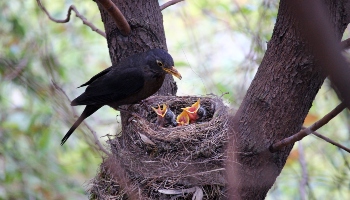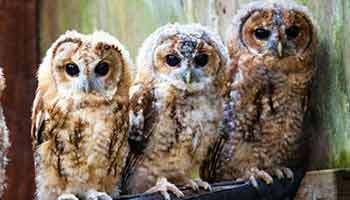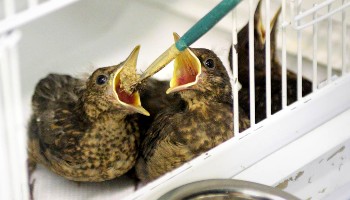Moving bird nests
Bird nests are protected under the Wildlife & Countryside Act 1981, so moving a nest at the wrong time could mean you're breaking the law. If you need to move a nest, read this page to find out when you are legally able to.
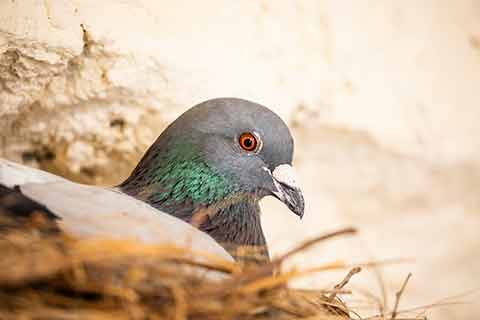
Bird flu warning
Due to the Avian Influenza Prevention Zone (AIPZ) currently in place across the UK, some baby birds can't be handled. Please follow our bird flu and baby bird advice to check which species can be handled and what to do.
Moving or destroying nests
Birds are at their most vulnerable when nesting. Any disturbance could kill or injure wild birds and their young - or cause parent birds to abandon their nest, eggs and young.
Nests can't be moved or destroyed while they're being built or still in use - apart from under certain exceptions to allow the control of certain birds for specific reasons under licence.
Be careful not to break the law on bird nests
Many people are unaware of the legal protection that birds, their nests, eggs and young have and what action they can legally take. However, reckless building work, tree-felling or hedge-cutting at the height of the nesting season can leave people facing prosecution.
Anyone found guilty of an offence could be given a maximum penalty of six months' imprisonment and an unlimited fine, which can be imposed in respect of each bird, nest or egg affected.
Don't carry out any activity that will affect nesting birds in spring or summer when birds are nesting - even if it's just in your garden. Instead, plan work for times of the year when nests aren't in use.
Also consider any other protected species that might be affected by the work, such as bats roosting in buildings.
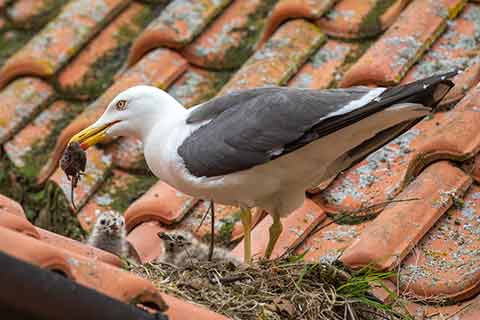
Removing a nest that's no longer in use
With some exceptions, you can remove nests as long as they're not being built or in use. However, please keep in mind that some species will have more than one brood in the same nest in a given season.
What's more, unless there's a reason to remove the nest, leaving it alone can be beneficial for wild birds.
For example, some species:
- Use nests as roosts outside the breeding season
- May reuse their nest the following year
- Reuse the nests of other birds - for example, buzzards take over disused crows' nests.
Clearing out nest boxes
If you're clearing out a nesting box after breeding season and you need to remove unhatched eggs from a nest that isn't currently being used, it's only legal for you to do this between 1 September and 31 January each year. If you do remove unhatched eggs, then you must throw them away, as it's illegal to keep them.
Stop birds nesting on your building
If you're having problems with birds nesting on buildings, there are some actions you can take to try and discourage birds from nesting there. Remember, though, that nests are protected while they're being built or in use, so you should take these actions well before the nesting season to make sure that you're not disturbing active nests - ideally, during winter.
Anti-perch methods
Anti-perching devices, such as spikes, are considered to be one of the most humane ways of trying to minimise problems caused by nesting birds. The spines are usually angled so that they are awkward to land on but won't impale the bird, but some may be designed to bend but be firm enough to provide an uncomfortable perching or roosting place. However, it's very important that these are properly installed by trained professionals and inspected regularly.
Bird netting and meshes
When it's installed properly, netting can provide a humane, long-term solution to controlling birds.
Using the correct size and tension of mesh will help to reduce the risk of birds getting caught in the netting. As with anti-perching devices, netting should be maintained and inspected regularly and installed by a professional.
Simple wire-frame structures can be placed around chimney pots. This will stop birds from settling and make sure they can't fold their wings when they land.
Read more about wild birds and netting.
Clear our potential nesting material from your roof
Clear all the moss and plants off your roof and out of gutters, as birds might use this as nesting material.
Accidentally dislodging a nest while gardening
If you accidentally dislodge a nest that's empty or being built, don't attempt to return it to the tree. It may be less stable or not sheltered enough, and more likely to be blown down at a later date if it's reoccupied.
There may be eggs that have been damaged too but parent birds will usually prepare a new nest for a new clutch of eggs.
If you dislodge a nest containing young, find out how to safely renest baby birds.

